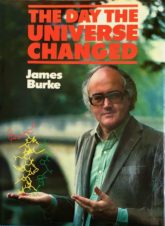
The Day the Universe Changed is the companion volume to James Burke’s television series of the same name.
The fully illustrated book looks at eight different moments in history when a change in the body of knowledge radically altered the accepted view, and in doing so gave birth to a major institution or way of thinking which has become basic to the modern world. Those key events were: the arrival of Aristotelian logic from mediaeval Arab Spain; the rediscovery of perspective geometry in Renaissance Florence; the development of the printing press; the study of trajectories that found the law of gravity; the religious and agricultural causes of the Industrial Revolution; the pairing of medicine with statistics in revolutionary France; the volcanic origins of evolution in the nineteenth century; and the American accident that brought quantum physics and the atom bomb.
In a final chapter showing the ways in which each of the differing views held was equally valid to the people concerned at the time, James Burke argues that knowledge itself is a human made artifact, that there is no such thing as discovery, and that when our views of reality are changed by knowledge, reality itself changes. Ultimately, the universe is what we say it is.

